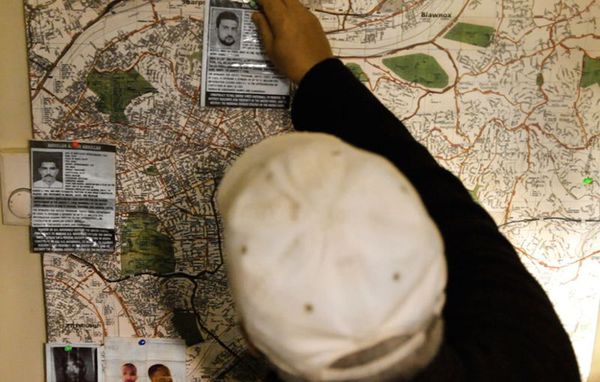Eye For Film >> Movies >> (T)error (2015) Film Review
(T)error
Reviewed by: Jennie Kermode

When concern about terrorism is high, there are always people who call for the security services to abandon their usual restraints and go all out to arrest potential offenders at any cost. It's easy to understand the strength of feeling behind this and easy to see how politicians can benefit from catering to it, but dropping safeguards doesn't only increase the risk of injustice, it increases the risk of incompetence. Both of these factors come to the fore in Lyric R Cabral and David Felix Sutcliffe's intriguing documentary.
Saeed 'Shariff' Torres is, for a black Muslim, remarkably close to a stereotypical American hick. He even pronounces 'fatwa' with a glottal stop. He's drifted through life making bits of money where he can and getting into trouble with the law. Now he's working for the FBI. He gets his instructions by phone, often in txt-speak, and he's paid a pittance. This, he swears, will be his last job. That's why he's invited the cameras along. He's going to let them see at least part of the work he does to find, befriend and betray a local Person of Interest. What he doesn't know is that they're also following other people, including one who is distinctly smarter than Torres has allowed for.

What unfolds is a comedy of (t)errors with a central character who shifts very quickly between dubious but likeable guy, buffoon and sociopath. It's suggested that most informants fall into the latter group because that's what it takes to repeatedly befriend and betray. But what's really at issue here isn't a matter of loyalty, it's the line between finding out what somebody thinks and persuading them to think it. The eventual fate of Shariff's target will make most viewers shudder. Was he really a dangerous man likely to have gone on to acts of violence, or is this a case of entrapment?
The FBI used to go after criminals after they had acted, but now they go after them before, we are told. We are squarely in Minority Report territory, but with far less certainty. How many people talk the talk but wold never walk the walk? This doesn't seem a world away from people saying they want to kill their bosses, perhaps fantasising openly about doing it, but with no intention of acting. Shariff works hard to justify his actions but doesn't really seem very confident about them. And there's the question: if pretending to support terrorism can persuade a person to consider it, what might denouncing it do? How much of the argument's thinking stems from Shariff's persuasion?
As the film goes on, Shariff comes across more and more as a fantasist, developing a persecution complex and talking about the sacrifices he must make to do this work. It's difficult to conclude much base on one informant, but this does raise some questions about the quality of intelligence the FBI is working with, and about what they might miss as a result. Shariff has a map on his wall with red lines drawn on it. It's too secret for him to explain, he says. He seems to think he's in a James Bond film.
(T)error is patchy and uneven but contains some fascinating material. It will be of particular interest to those familiar with MK Ultra, who may see it bizarre behaviour reflected here. When we watch the watchmen we see flawed human beings, and that is perhaps the most terrifying thing of all.
Reviewed on: 14 Nov 2015
















